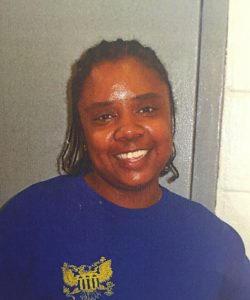In 1996, life without parole was the fate of the Black teen, Michele Benjamin, who allegedly killed a White man soliciting her for sex in New Orleans.
Backtracking to 1994 on a Sunday at midnight, the Appeal reported that 16-year-old Benjamin and an 18-year-old friend, Chanda DeSilva were out exploring the city's French Quarter, when they were approached on Bourbon Street by Martin Hecker, a German serviceman stationed at an Alabama army base, Fort Rucker. Benjamin said Hecker told the young women he could walk them home.
According to State V. DeSilva, the story darkens at about 4 a.m., as grounds patrol officer Dwight Powell finds Hecker with a gunshot wound in the middle of the street near Louis Armstrong Park with DeSilva standing adjacent to his lifeless body. An autopsy report showed that Hecker died from one gunshot wound to the left side of his body, which subsequently injured his left lung, spleen and aorta.
State v. DeSilva further details Benjamin's following account of what happened:
Ms. Benjamin stated that as they were walking, the victim told them his wife was in Germany, that he had no companion in New Orleans, and that he was looking for a "date." Ms. Benjamin insisted she refused to be his date, and she dropped back behind the victim and the defendant [DeSilva]. As they neared the corner of Marais and St. Philip, the victim produced a gun, and it discharged. She stated she was afraid he would shoot her, and she grabbed the gun. She stated she and the victim struggled over the gun, and she kicked him in the groin. She stated she was able to turn the gun toward the victim, and the gun discharged again. She stated the victim "body-slammed" her to the ground. She stated she got up and ran from the scene. She denied taking anything from the victim, and she insisted no one discussed money. She also insisted neither she nor the defendant [DeSilva] had a gun.
According to the Uptown Messenger, DeSilva was first considered a witness but later became a suspect as her story changed countless times. DeSilva turned in Hecker's wallet to the police and also stated Benjamin pulled the gun on Hecker seeking to rob him. The Uptown Messenger stated that there were no records found on the gun past September 1973, when it arrived in a store on Howard Avenue.
Make sure you're following Blavity:Politics on Instagram and join our daily newsletter to stay engaged and informed.
The Appeal states that Orleans Parish prosecutors were suspect of Benjamin's story because of her status in a society- a homeless Black teenage mother. Still, they acknowledged Hecker did solicit Benjamin and her friend for sex. Benjamin had no previous criminal history.
DeSilva and Benjamin were charged with first-degree murder. According to the Uptown Messenger, Desilva was convicted of manslaughter serving 20 years and in a separate one-day trial, Benjamin was convicted of second-degree murder with a dim future of spending the rest of her teen days and life behind bars.
In 2012, hope began to shine through for Benjamin's conviction with the Supreme Court ruling of Miller V. Alabama, which "forbids a sentencing scheme that mandates life in prison without the possibility of parole for juvenile homicide offenders." The only problem was that this case applied to future cases, not past cases.
What was pivotal in Benjamin's release was the 2016 Supreme Court ruling, Montgomery v. Louisiana, which ensured that the former case applied to past cases of juvenile offenders like Benjamin. According to the Appeal, Benjamin was sentenced to life with the option for parole in 2016.
Fast-forward to 2019, Loyola University New Orlean's Stuart H. Smith Law Clinic and Center for Social Justice's continuous filing of appeals since 2012 on behalf of Benjamin proved successful. The now 41-year-old has been granted parole and the chance to spend her life outside of a prison cell.
Community platforms such as case management service organization Women with A Vision, Sister Hearts Re-Entry Program and Strength for Today Mentorship Program are offering social services as a part of Benjamin's transition back into everyday society.
“If she was a white teen that attended a prestigious high school—who wasn’t homeless, who wasn’t a teenage mother, who wasn’t poor, I wonder if she would have been sentenced the same or charged the same or even arrested at all,” said Christine Breland Lobre, program director of Women With A Vision. “I wonder if she would have been seen as a victim rather than an offender.”
Eliana Green, a third-year law student that participated in Loyola's felony criminal defense clinic, acted as legal representation along with her clinic professor, Dr. Majeeda Snead. Green was responsible for crafting a pro-bono plan for re-entry for Benjamin, in terms of preparing oral arguments for parole hearings and helping her to secure employment, housing and letters of recommendation.
"My goal is to redistribute power to gain methods of creating black liberation," said Green. "I'm honored to advocate for women like Michele and remind them that they are valuable, they are important and they are worthy of love."
Check these out:
Ohio College Student Reportedly Abducted Then Killed By Father Of Her Child
